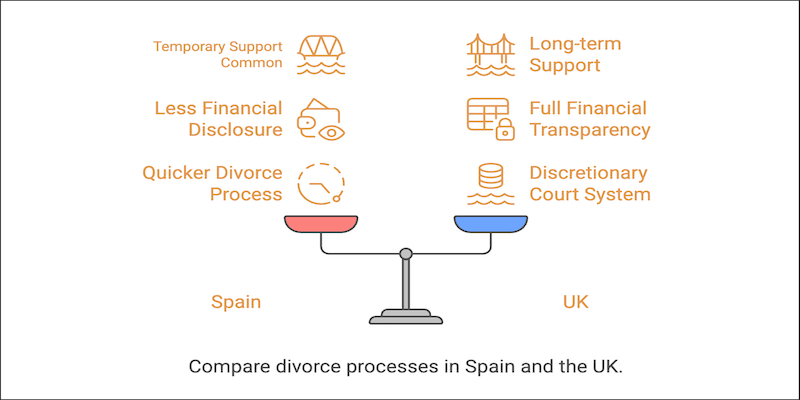If you’re a British expat going through separation in Spain, it’s perfectly reasonable to have a growing list of urgent questions. Do you need to get divorced through the Spanish legal system? As an English or Welsh national, could you instead use the courts ‘back home’? If both options are on the table, which country would be most receptive to your case?
Divorce in Spain for non Spanish nationals is a complex subject that doesn’t always offer simple answers. Not only are there subtle differences between the two countries, but the specifics of your relationship could also tip the balance in either direction. For instance, perhaps you’ve already got divorced in the UK and need to know how the exequatur divorce process (explained later) could help you to enforce an order overseas?
Whatever your background, however challenging your current situation appears to be, we aim to make everything clearer and set you on the path to a positive outcome.
How Does Divorce in Spain for Foreigners Compare to the UK?
Over time, gradual changes in the English and Welsh legal system has seen divorce laws become broadly comparable to those in Spain. Spanish courts adopted the ‘no fault divorce’ approach back in 2005, with the UK following suit in 2022. However, there are some notable differences between the two countries.
Firstly, you only need to have been married for three months to be eligible for divorce in Spain. In England and Wales, this timescale is one year. Additionally, if your marriage is legally recognised in England and Wales you will need to confirm that it has irretrievably broken down. In Spain, all that is required is for one or both parties to sign the petition.
Divorce in Spain for Foreigners: Could You Qualify?
Every country has its own unique divorce laws. Understanding how these apply to you could have a major influence over such crucial factors as which jurisdictions will be most favourable to your circumstances.
Divorce in Spain for foreigners will depend upon whether your relationship meets the following criteria:
- Either you or your spouse is a Spanish resident. Failing this, your children live in the country.
- You must have appointed a Spanish lawyer to lodge your divorce petition and obtain a divorce order.
- Your lawyer must explain how the likes of child custody, maintenance, living arrangements, and finances will be handled going forwards in a proposal of governing convention.
- The convention will need to be translated into Spanish, as will documents such as your marriage certificate, dependents’ birth certificates, your address in Spain (known as an empadronamiento).
- Either you or your spouse will need to have been resident in the country for a minimum of six months before your petition.
Your Divorce Rights, Properties & Procedures Explained
According to Spanish family law, the division of assets such as property will depend on which process the marriage initially followed. These processes — known in Spain as regimes — are called the economic community of property process, the separation of property process, and the participation process.
Furthermore, if the separation has damaged one party’s financial security, they could receive additional support as compensation. This can be a complex area of law, as Spain applies different property regimes depending on where you married and where your assets are located.
These regimes work as follows:
- Community Property Regime (Sociedad de Gananciales): All assets acquired during the marriage are split 50/50 upon divorce.
- Separation of Assets Regime (Separación de Bienes): Each spouse retains ownership of what they individually purchased.
- Participation Regime: A hybrid system where spouses maintain separate assets but share in each other’s financial gains upon divorce.
If you purchased property together in Spain, the title deeds (escritura pública) will indicate the ownership structure. You may need to negotiate a sale, a buyout, or an agreement on continued joint ownership. Lowry Legal can help you to find a Spanish lawyer who can guide you through this process, especially if the property is mortgaged.
Child Arrangements
When it comes to child arrangements, both parents are seen as having an equal right to make important decisions. These include where the children reside, which schools they attend, and what kind of healthcare they receive. However, it’s important to note that these decisions must not contradict a pre-existing custody arrangement, and there may be variations depending on personal circumstances.
Spanish Divorce Procedures
When a divorce petition is filed in Spain, it will either be uncontested or contested. If it’s the latter, one party does not agree to the separation, which can lead to drawn out and stressful negotiations about who gets custody, how assets are divided and what would constitute reasonable maintenance payments. In these cases, you can expect your divorce to take up to a year to be finalised.
If, however, both parties are in agreement about the divorce, this is regarded as being uncontested. This will result in both spouses being able to enlist the services of the same lawyer, while making financial and child arrangements much easier to address. Uncontested divorces are known in some quarters as ‘express divorces’ on account of the potential reduced timescales involved.
Divorce in Spain for Foreigners Vs Divorce in the UK
If you meet the criteria, divorce in Spain for foreigners could appear to be relatively straightforward. However, many British expats living overseas might be presented with a choice between the English and Welsh courts and their Spanish counterparts. Using an established international divorce solicitor will help you to assess the advantages and disadvantages of each option, giving you a better chance of a favourable outcome.
Although your decision should be influenced by which system is more conducive to your situation, there are some general observations that might be useful. In broad terms, the English courts are widely seen as being more efficient, economical, and effective than Spanish jurisdictions. In fact, the Spanish courts are often perceived as being overly bureaucratic and, therefore, slow-moving.
Most importantly, the Spanish and English legal systems could adopt different approaches when it comes to division of assets. For example, in the UK, financial disclosure is regarded as non-negotiable, with found offenders risking a reduced settlement or worse. However, in Spain this is not the case, so the scope for hiding assets without penalty could be significantly higher.
To further complicate matters, separate regions within Spain often have their own specific regional version of matrimonial law. This means that not only can the country in which you separate affect your share of assets, but the locality could as well. At Lowry Legal, if you choose to divorce in Spain we will signpost you to recognised lawyers in your locality.
Why Choose Spanish Courts Over UK Courts?
If you’re eligible to file for divorce in both Spain and the UK, making the right decision is crucial. Your choice of jurisdiction could significantly impact financial settlements, child arrangements, and how long the process takes. The decision you make will depend upon your circumstances and goals.
When separating in Spain you can expect:
- Faster Resolution: Spanish courts typically reach decisions more quickly than UK courts.
- Lower Costs: Legal fees and court costs are generally lower in Spain.
- Favourable for Asset Division: Spanish courts may provide more favourable outcomes for high-net-worth individuals due to different property division rules.
- Efficient Cross-Border Enforcement: Spain has strong mechanisms to enforce international divorce settlements across the EU.
- Privacy: Court proceedings in Spain are more private, offering greater confidentiality.
Flexible Jurisdiction Rules: Spanish courts are often more flexible when considering jurisdiction, particularly for expatriates and international couples.
The Key Differences When Considering Divorce in Spain for Foreigners

Since each case is unique, a specialist international divorce lawyer can help determine the best jurisdiction for your specific circumstances.
Can I Remarry After Divorcing in Spain?
Once your divorce is legally finalised in Spain, you are free to remarry. However, there are practical considerations, which include waiting periods, annulments, and correct documentation. To simplify this process, it’s important to obtain legal advice in advance — as this will ensure that every detail is taken into account.
- If your previous marriage was registered in the UK, you may need to present a Spanish divorce certificate (sentencia de divorcio) when remarrying abroad.
- Some regions in Spain require a waiting period before remarriage, so check local regulations.
- If you plan to remarry in a religious ceremony, certain faiths may require additional annulment procedures.
For official guidance on remarriage procedures in Spain, refer to the Spanish Ministry of Justice.
Exequatur & Divorce
If your separation has been finalised in the UK, but you want it to be enforced in Spain, it’s vital to understand the concept of exequatur & divorce. An exequatur divorce describes the process whereby a judgement in an overseas court, ie England and Wales, is recognised and upheld by the Spanish legal system. You might need an exequatur for the following scenarios:
- If one party is either a Spanish national or resident, the exequatur divorce process might be required to have your UK divorce recognised in that country.
- In order to compel a resident of Spain to pay maintenance.
In order to present an exequatur, it will need to be written by a Spanish-speaking lawyer, with the following documentation also being required:
- A duplicate of the document, with the official endorsement known as the ‘apostille’ from The Hague.
- A certificate testifying that the decision/judgement is final.
- A certificate confirming that the ‘defendant’ is fully aware of the courts’ decision.
- A sworn Spanish translation of the decision.
- A photocopy of your passport.
- A General Power of Attorney for litigation.
- The marriage certificate and children’s birth certificate.
Lowry Legal: Fearless Support That Crosses Borders
As a specialist in high net worth divorce, Lowry Legal has extensive experience of complex separations. As a compelling choice for the likes of entrepreneurs and public figures, we realise that international families are a prominent feature of the modern age. When these relationships come to an end, they often lead to urgent conversations about the future of overseas properties, international business empires, and child arrangements.
When the stakes are this high, the need for decisive action and informed decisions becomes paramount. This is only possible when you work with a firm that puts your needs first and concentrates on your most crucial objectives throughout. The type of legal outfit that can provide the ideal combination of understanding, sensitivity, and innovation.
Experience has taught us that collaboration is the optimal route to a quicker, calmer divorce. This approach can demystify the divorce process and allow both parties to focus on the future without succumbing to recriminations. However, as realists, we also know that this isn’t always suitable, so can provide resolute and unflinching representation when necessary.
To speak to one of our family law specialists, contact us today, or email enquiries@lowrylegal.co.uk.
Request a Callback
Leave a few details below and one of our team will be in touch to discuss how we can support you with your legal needs. Please note that we cannot offer Legal aid.













